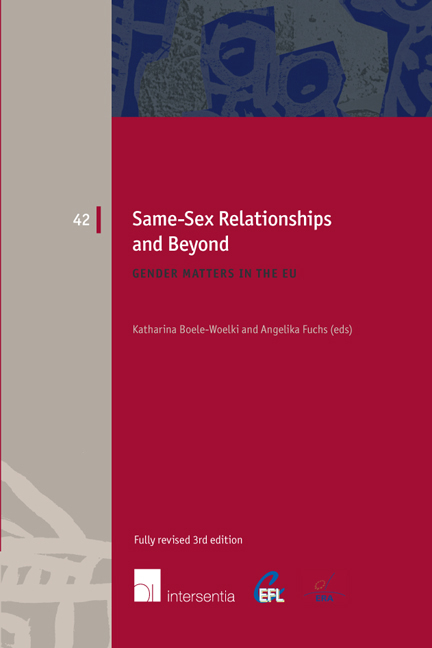Book contents
- Frontmatter
- Preface
- Contents
- List of Authors
- Part I Formalising a Same-Sex Relationship: Marriage and Partnership
- Northern Europe: Same-Sex Relationships and Family Law
- Legal Recognition of Same-Sex Relationships in Central Europe: Steady Progress
- Southern Jurisdictions: Consolidation in the West, Progress in the East
- Same-Sex Partnerships in Eastern Europe: Marriage, Registration or No Regulation?
- Part II Parenthood and Children's Rights
- Part III Gender Identity and Human Rights
- EUROPEAN FAMILY LAW SERIES
Legal Recognition of Same-Sex Relationships in Central Europe: Steady Progress
from Part I - Formalising a Same-Sex Relationship: Marriage and Partnership
Published online by Cambridge University Press: 29 September 2018
- Frontmatter
- Preface
- Contents
- List of Authors
- Part I Formalising a Same-Sex Relationship: Marriage and Partnership
- Northern Europe: Same-Sex Relationships and Family Law
- Legal Recognition of Same-Sex Relationships in Central Europe: Steady Progress
- Southern Jurisdictions: Consolidation in the West, Progress in the East
- Same-Sex Partnerships in Eastern Europe: Marriage, Registration or No Regulation?
- Part II Parenthood and Children's Rights
- Part III Gender Identity and Human Rights
- EUROPEAN FAMILY LAW SERIES
Summary
‘Central Europe’, for the purposes of the present chapter, is made up of Austria, the Benelux countries, France, Germany, the Republic of Ireland and the United Kingdom. At first glance, this area seems best characterised by the phrase ‘steady progress’ as far as same-sex couples are concerned: since the second ‘Legal Recognition of Same-Sex Relationships in Europe’ conference was held in 2011, same-sex marriage has been introduced in France (2013), England and Wales (2013), Scotland (2014), Luxembourg (2015) and Ireland (2015). Nonetheless, a few quirks are revealed when these legal systems are more closely scrutinised. Furthermore, taken together they provide an opportunity for fruitful comparisons and a useful starting point for theoretical discussion.
In all of these jurisdictions, same-sex couples can choose between at least two of three conceivable options: marriage, a registered partnership and the default option of non-registration. This seems to suggest that these three options should be discussed successively. However, not only do marriage and registered partnerships share the characteristic of being formalised through the intervention of a public authority, unlike de facto relationships, they also entertain a dialectic relationship that can best be described by grouping them together. Moreover, de facto relationships raise some specific issues, which further justifies them being analysed separately. Formalised relationships will thus be tackled first (section 1), then de facto relationships (section 2), followed by brief concluding remarks (section 3).
FORMALISED RELATIONSHIPS: MARRIAGE AND REGISTERED PARTNERSHIPS
As far as formalised same-sex relationships are concerned, the systems of registration adopted by the jurisdictions gathered under the ‘Central Europe’ umbrella can be assigned to one of the three categories identified by Ian Curry-Sumner: the pluralistic (section 1.1), monistic (section 1.2) and dualistic (section 1.3) models of registration. The situation in Britain is extremely peculiar as a result of legislation having been paused in an unlikely place; England and Wales, together with Scotland, should thus be dealt with separately (section 1.4).
PLURALISTIC SYSTEMS: BELGIUM, FRANCE, THE NETHERLANDS, LUXEMBOURG
In a pluralistic system, ‘couples are offered two possibilities for formalising their relationship, irrespective of their gender, namely marriage or a form of non-marital registered relationship’.
- Type
- Chapter
- Information
- Same-Sex Relationships and BeyondGender Matters in the EU, pp. 19 - 38Publisher: IntersentiaPrint publication year: 2017
- 1
- Cited by



